NEWS Added Before 2002
| Also see: Molokan People (Russian), Molokan Home Page, Molokan History, Molokan Genealogy, Molokan.net (now off-line) Molokan Forum (English, Russian); Doukhobors |
more Molokan and Jumper NEWS: 2000, 2002, 2003, 2004
Back to Molokans and Jumpers Around the World
2001
Donald
Shubin, in the News Added Dec
13
2001 October 4 Trash strike skips Tustin UNION: At least for
the time-being, the city's waste haulers are on the job The
Tustin News "Federal Disposal owner Don Shubin said ... "At this
time, we're escaping the problems of the strike because we currently
are non-union," ..
Shoobs' Homepage Added Dec
13
Josh Shubin born in Escondido. Graduated San Marcos High School in '99.
... surf scene .. snowboarding and skating. ... Embry Riddle,
Prescott, Arizona. ... best aviation school in the country. .. private
pilot's license on December 21, 1999. .. Multi Engine Instrument
rating. Lots of pictures.
 Katie
Shubin, Charlotte Eagles
Added Dec 13
Katie
Shubin, Charlotte Eagles
Added Dec 13
2001 Charlotte Eagles Soccer Club. Hometown: Whittier CA. Midfielder.
Kinesiology Major at Wheaton College. See team photo
of 2001 W2 National Champions.
Leah
Shubin, Army Volleyball Added Dec
13
 Garces Memorial High School, Bakersfield CA
Volleyball Named first-team all-league during her senior year ...
played on prestigious Kern River club team for five years ... named
high school MVP following her senior season.
Garces Memorial High School, Bakersfield CA
Volleyball Named first-team all-league during her senior year ...
played on prestigious Kern River club team for five years ... named
high school MVP following her senior season.
2001 Oct 27 Army
Stumbles In Loss To Lehigh: Leah Shubin Collects 17 Kills in Losing
Effort West point NY
2000 October 6 Point View "Sophomore
outside hitter and middle blocker Leah Shubin goes to the net".
Molokans Singing
in Jail
Added Dec 13
2001 Spring Roots and Fruit, No. 7 Civilian Public
Service One Phase by Charles W. Baker Being jailed in 1946 ...
the singing of the Russian Molokans. How eerie and also
heartening sound behind the bars. Spirit reigns, Molokans,
... from ... Fresno area, Phoenix, Los Angeles. ... The Molokans,
an obscure sect, as non-war people were a part of Civilian Public
Service (Conscientious Objectors) during World War II. Of the
approximate 12,000 inducted into CPS there were 76 Molokans,
...John Tolstoy ... died in CPS.
Molokans
in the Genocide Added Dec
12
Genocide Facts The Armenian Terrorism Against the Turks
Armenians followed the policy of annihilation of all the Turks in the
Southern-Caucasus. In April of 1918 they smashed up 82 villages in Gars
[Kars]. Armenians committed unseen
violences in Turkish areas seized by Armenian Republic. They burst into
Chakhmag [Chakmak], Yukhary Kotanly,
Ashagy Ko-tanly, Oluklu, Kamarly, Tuzluja, Vujuklu, Subhanazad, Igdir,
Javlak, Garajayir, Pasly and other villages in the north of Gars [Kars], and neighbouring Molokan ones,
committed massacres and robberies. Molokans who willingly
helped Armenian terrorists in She-makha and Lankharan [Lenkoran] were also pursued by them and asked
Turkey border troops for help as Turks did.
Molokan Cow in Turkey Added Dec
12
1997 July Rome The United Nations for Agriculture World-wide
list of Monitoring for the Diversity of the Domestic Animals
List of Missing Species "This is a list of the species registered
likely to disappear, by region and species ... Turkey, Molokan
Cow (Bovino Malakan) stems from the Ukrainian Grey." We first
found references to the Molokan dairy cow and Molokan horse while
translating the source material for the up coming Molokan
Heritage Collection, Volume II: Molokans in Turkey.
2
Molokan groups in Moldova Added Dec
12
2000 June 29
Official Report by the Republic of Moldova on the Implementation
of the Framework Convention for the protection of National
Minorities (MS-Word.doc) "The creation of
favourable conditions for the functioning of religious bodies is a
factor in their increased numbers. 18 State-recognised religious bodies
currently operate in Moldova. The most important of these are:
# 14. the Union of Communities
of Molokan Religious Christians, two communities."
Molokan
Colony in Mexico Added Dec
12 Updated
June 2006
-
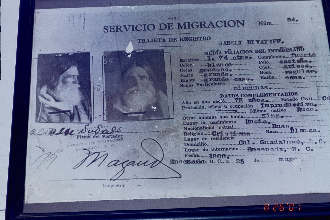 2001 August 26
Valle de Guadalupe/Ensenada 3 photos by Baja Barb
and David Eidell at the Malakan-Russian colonist exibit. ....
One of the Malakan's immigration forms. Malakan's
were a religious sect that left Russia at the turn of the last
century. ... Local bread, wine. grape juice, & olive oil are
for sale at the museum.
2001 August 26
Valle de Guadalupe/Ensenada 3 photos by Baja Barb
and David Eidell at the Malakan-Russian colonist exibit. ....
One of the Malakan's immigration forms. Malakan's
were a religious sect that left Russia at the turn of the last
century. ... Local bread, wine. grape juice, & olive oil are
for sale at the museum. -
2001 Aug 27 by David K [off-line in 2006, sorry] General Baja Discussion Center Archive, Volume 29 "Ahead are TWO museums, both are must sees! The first one is on the left and incorporates an original Russian/Malakan home. Guadalupe was the primary location for the Malakan sect of Russian immigrants fleeing the czar's persecution at the turn of the last century. They have many photos, artifacts, plus: red wine and excellent grape juice for sale. .... The lady in charge gave us an excellent historical review (in Spanish) as we moved from display to display." ...
-
2001 Aug 19 by Roberto [off-line in 2006, sorry] General Baja Discussion Center Archive, Volume 29 "Francisco Zarco is also interesting as it had a Russian community of people who fled Russia due to religious persecution. They were known as the Malakans, and founded a colony there in 1905. There is not much evidence of this, though there is a "Centro Comuntario Ruso" and a small museum, before the winery on the opposite side of the street."
-
EnjoyEnsenada.com, Local Tour, Day 3: [off-line in 2006, sorry] "Francisco Zarco. A town established by Russian immigrants of the Molokan sect who settled in the Guadalupe Valley in the early 1900s. Spend some time at the Museo Comunitario del Valle de Guadalupe, situated inside an original Russian home dating from 1905. The museum displays an interesting exhibition of photographs, farming implements and the historic memorabilia of Russian pioneer families plus crafts from the nearby Paipai and Kumiai Indian communities."
- Museo
Comunitario Del Valle De Guadalupe: In 2006, a Google search finds
19 items mentioning the museum's full name.
Russian Molokan Melody Added Dec
12
Music for School Orchestra, Chorus and Double Bass Northfield Press
Choral Music Paul and Barnabus: Russian Molokan
Melody composed by William Rich SATB Chorus and
Piano. Listen to the MID sound file, but you'll have to join
MSNuser.com to get the sheet music.
More from LucksMusic:
What's new for 2002???
PAUL & BARNABUS (RICH) (ME) Based on a Russian Molokan Melody.
Molokans are Russian Christians who emigrated to California to escape
persecution. Singing was a very important part of their musical
tradition. Some of the characteristics that defined their style are
incorporated into this work such as 'call & response' canonic
effects and rough-hewn harmonies. #59541.
Molokan whirl
dance? Added
Dec 12
World History of the Dance by Curt Sachs "In
Europe we have the "loss of self" motif clearly illustrated in the
whirl dances of the Russians sects of the Molokani in
Armenia....All the countries that bordered the Meditteranean in ancient
times, and the less remote sections of Asia as well, appear to have had
whirl dances."
Lost Relatives: "Sutremin"
Family Added Dec
12
"My ancestors on mother's side were (supposedly) minor
landlords, "starovery - molokane". Sutreminy from either
Tambov or Tver area. Before the revolution of 1917 they were deprived
of all their estate and sent to exile to Baku, Azerbaijan. All my
attempts to trace any information about this family name has been
futile so far. Era N."
Molokan Garden in Song "Baku" Added Dec
12
From CD of Leyla va Dayirman group translated into English
by Farida Aghayeva put on the Web by Farida Sadikhova
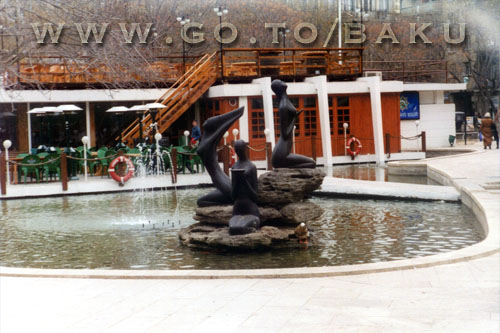 "... I never get tired of
walking in Baku,
"... I never get tired of
walking in Baku,The Boulevard in winter, beach in summer,
Everyday I come to Malakan garden,
Everyday I bow to Martyr's Alley.
I pass the narrow streets of the Old City,
It's the memory of the centuries. ... "
Read more about the Molokan
Garden at Molokan
Square in Baku. The park is in central old downtown
Baku, 2 blocks from the ocean.
Molokan
Farm in Azerbaidjan Added Dec
12
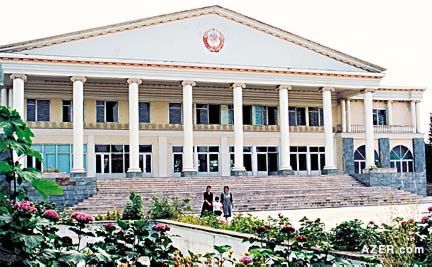 2000 Autumn Seeds
of Change: Transition in Azerbaijan's Agriculture by Arzu
Aghayeva "The Soviet collective farm [in photo], known as a kolkhoz,
found in the Ivanovka village in the Ismayilli region in central
Azerbaijan. This kolkhoz is operated by Malakan Russians and during the
Soviet period was a model project because of its high production.
Photo: Litvin"
2000 Autumn Seeds
of Change: Transition in Azerbaijan's Agriculture by Arzu
Aghayeva "The Soviet collective farm [in photo], known as a kolkhoz,
found in the Ivanovka village in the Ismayilli region in central
Azerbaijan. This kolkhoz is operated by Malakan Russians and during the
Soviet period was a model project because of its high production.
Photo: Litvin"
Molokane + Khlysti
= Mormoni
Added Updated Dec 12
2001 March-April Photos, Maps, References, Contacts About a
year ago James Scott, a senior at Brigham Young University in Utah,
asked me if I knew anything about Molokan-Mormoni. Molokans in Saratov
who had several wives and were called Mormons by the local Orthodoxy.
There is no connection with the LDS Church in America. For 3 weeks this
year James traveled in Russia to see for himself, and check the
archives. His full report with photos and maps showing many former
villages is posted. Because these "Russian Mormons" pledge secrecy, it
is almost impossible for outsiders to find out much. Over 40 villages
existed, and there is still an active congregation just north of the
city of Saratov. His analysis is that these "Mormons" are a
historical hybrid of Khlysti and Molokans. This is also a theory
for the formation of the Maksimisti. In the future, local Molokans from
our Saratov sobranie may help this research.
Orthodoxy
and Gnosticism in Russia Added Dec
10
Orthodoxy and Gnosticism in Russia: The conflict between the
Orthodox Church and American missionary groups in the post-Soviet Russia,
by Inna Naletova page 9 "Gnostics
... are not inclined to discover that human beings ... are
inadequate... the fault should be found in the wickedness
of the world. ... This attitude also finds its reflection in Russian
sectarianism. Among various Russian sectarian groups, Chlysti, Scoptsi
and Molokane should be noted as the strongest and the most popular.
Each in its own way, they believe in man's pure or divine origin. The
Chlisi, for example, are known for their ecstatic celebration of the
presence of Christ in each member of heir group. The Molokane,
tracing their beliefs back to the ancient time, opposed the Orthodox
belief in the nature of Christ as fully divine and fully human: the
humanity in God presupposes His imperfection and suffering which seem,
in gnostic beliefs, totally unacceptable."
Cultural
Diversity in Armenia
Added Dec 10
"This web site was developed within the framework of the program "Our
Cultural Diversity" with the support of the Department of Cultural
Diversity of UNESCO. It aims to represent all the ethnic groups
inhabiting Armenia on the ... Internet, as completely as possible. The
total number of national minorities living in Armenia makes up 3% of
the population."
-
The Religious Ethnic Group of Russian Christians (Molokans) in Armenia, by I. Semionov, President of the Foundation of Help and Assistance To Russian Compatriots in the Republic of Armenia.
-
The foundation of support and assistance to Russian compatriots living in Armenia is a charitable non-governmental organization, established in order to support various assistance to ethnic Russians in Armenia. It provides material support to those in need, provides protection of citizen, social and cultural rights, search and arrange job opportunities, etc. The Foundation also provides medical assistance to old people, disabled and socially unprotected living in Russian villages of Armenia.
-
The Russian, by I. V. Dolzhenko and H. G. Sargsyan "So, the Molokan Russians do not have any interethnic marrying."
-
Nationalities of Armenia, by Hranush Kharatyan "Second large community in Armenia are Russians. The first resettelers of 1886 were Molokans members of religious sect originated in Russia in XVII-XVIII centuries. Moving them to Armenia Imperial Russia followed two objectives to take root over newly gained territories, and to get rid of sectants. There was some number of ethnic Mordovian Molokans who settled beside Russians and separately (Shorja village). Migration of Orthodox Russians also existed in the late XIX century there were 17 sectant and 6 Orthodox Russian villages in Armenia."
A town named Malokan in India Added Dec
10
District Jhajjar (Haryana), India "about eight hundred years ago ...
There was a town named Malokan in the east of present Jhajjar city,
mostly inhabited by Jats. ... Malokan was also among there ill-fated
villages. Having left their homes and belongings, the residents of
Malokan started living here and there. ....Brave Chajju Jat, resident
of Malokan village made an appeal to Emperor Shabuddin Gori to
rehabilitate the village. Malokan village had fought bravely to defend
the country against the Goris, probably due to that the emperor
rejected the appeal of the residents of Malokan and ordered to
rehabilitate the village...."
Letter to you from the Holy
Spirit ![]() Updated Jan 8
Updated Jan 8
1998 Translated letter sent to all American Molokan Jumper-Maksimist
congregations from the Clark Ave congregation, La Puente, California
(west of Los Angeles). Original Russian grammar is corrected. And the
popular "Open Letter" reply. This announcement is similar to the March
31, 1997 declaration by the Union of Orthodox Rabbis of the United
States and Canada that "Reform and Conservative are not Judaism at
all"... Molokans don't have the Russian Orthodox Church to battle
anymore, so now we fight against each other.
Molokan
Refugees Visited in Tula, Russia Added Nov.
27
1993 Change as Confirmation of Continuity As Experienced by
Russian Molokans by Margarita Mazo, PhD, Ethnomusicologist,
Music Department, Ohio State University In 1992, Dr. Mazo, the only
Russian born and trained ethomusicologist at an American university,
visits a new Molokan village south of Moscow composed of refugees
mainly from Armenia and Georgia. She describes a service with guests
from the Molokan Center in Stavropol' and attempts by a young leader to
preserve his religious culture after perestroika. Mazo later arranges
for Russian and American Molokan singers to meet in America.
American Jumper
Community Prayer December 9 Added Nov.
21
2001 November American Jumper congregations announce a community
prayer for the hand of the guardian angle to protect our people during
these times of world crisis. All congregations to hold a special
service on Sunday December 9, 2001.
www.ChristianPacifism.com Added Nov.
21
2001 February The Conflict of Ages: A History and
Treatise on the Dichotomy between Military Service and Christian
Pacifism by Daniel H. Shubin "The purpose of this book is to
provide the members of the American Christian Community a codified
explanation of the Bible basis to conscientious objection to military
service including the vocation in military industries." The book deals
with the Old Testament view of warfare, the New Testament teachings of
Jesus; the attitude of the early Church toward the military; a history
of Christian pacifism from apostolic times to the present, and the
present role of the Christian pacifist .... "The primary
preceptor of the Russian Molokans was Semeon Matveeich
Uklein, who preached from 1760 to 1805 throughout central
Russia."... See
more books by Shubin.
3,000 Molokans in
Armenia in 1999 Added Nov.
21
2001 August 10 Johnson's Russia List "... in Armenia ...
by 1999 8,000 Russians remained in the country (3,000 of them are
Molokan village inhabitants)." ...
Extinction
Predicted of Russian Molokans NOT! Added Nov. 21
1975 April Comparative Studies in Society and History 17:2,
pages 221-237 University of Michigan Christel Lane, Socio-Political
Accommodation and Religious Decline: The Case of the Molokan Sect in
Soviet Society. The "utopian" society of Molokanis
flourished in Tsarist times as the perfect community. During Soviet
times it failed to attract new members, and those looking for an
alternative world view joined other Western religions, except the
Leapers/Jumpers and Maksimisti in the Caucasus. Since 1990, after
perestroika, over150 Molokan Constant (majority), Spiritual, Jumper,
and Maksimisti congregations surfaced in the FSU largely continuing
their "sectarian" existence by the force of tradition. But their
close-knit community has become more and more difficult to maintain.
All Molokan Holidays Added
Updated Nov. 18
The chart shows all the holidays
celebrated by all sub-groups of Molokans in Russia and America, that I
know about. There are two categories of holidays
Christ's and God's. Every holiday is important, but the Contants
and Maksimisti each reject half of our holidays.
What
Should a Nurse Feed a Sick Molokan? Added Nov.
9
[PDF File] Culture and Nursing Care: A Pocket Guide by Lipson,
Juliene G UCSF Nursing Press (University of Califonia, San
Francisco): "Three meals a day, lunch the heaviest. Snacks in between
with hot tea or fruit. No pork or various shellfish with some Jewish
and Molokan Russians."
Russian Church Laws and
Molokans
Added Oct. 28
2001 MOST Journal on Multicultural Societies, Vol.
2, No. 2 "Religious
pluralism and national identity in Russia" by Dr. Alex Agadjanian, Arizona
State University This is the first confirmation I've found that
Molokans in Russia are legally okay today. "They
[Molokans] are certainly not viewed as bad as the foreign sects
especially new religious movements, and the attitude towards them is
ambiguous. ... I think they don't have many problems with the new law,
but are still treated coldly by the Orthodox Church. The paradox ... is
that they really represent very much what the Russian identity is, but
at the same time are not as quite 'correct' Russians." Dr. Agadjanian
clarifies an oversight in his paper which shows a rank order of
religions in Russian today, but omits the sectarians (Molokans,
Doukhobors, etc.).
 Amazing Corn Field Adventure
Added Updated Nov 18
Amazing Corn Field Adventure
Added Updated Nov 18
2001 October 26 Arizona Republic For a second year Bill and
Gracie (Mendrin) Tolmachoff have tried to make some extra money with a
Halloween-season corn maze the Amazing Corn Field Adventure.
Tolmachoffs claim it's an educational farm experience, but the city of
Glendale, Arizona, wants him to get a carnival license.
Where Molokans
Traveled in the 1800s
Added Updated Oct. 26
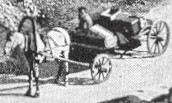 1930 Lands
and People has a short description of the Molokans, but some
wonderful pictures of the roads. And just as interesting is are the
German millenialists, whose prophesies and leader Jung-Stilling was
important reading BEFORE the Spirit and Life was published!.
1930 Lands
and People has a short description of the Molokans, but some
wonderful pictures of the roads. And just as interesting is are the
German millenialists, whose prophesies and leader Jung-Stilling was
important reading BEFORE the Spirit and Life was published!.
Molokan
Church-Building
Added Oct. 18
2002 Feb 23 Nicholas Breyfogle (History, Ohio State), will present a
new paper: "Prayer and the Politics of Place: Molokan
Church-Building, Tsarist Law, and the Quest for a Public Sphere in Late
Imperial Russia" at Sacred Stories:
 Photos of
Karakala, Kars
Added Oct. 2
Photos of
Karakala, Kars
Added Oct. 2
Thanks go to Joyce Bivin
for supplying these photos and captions. Joyce is an American-
Armenian- Molokan who has been exploring her family history for over 10
years.
Molokans in Persia Reported in
Book
Added Sept. 25
1953 Light Through the Shadows: The True Life Story of
Michael Simonivitch Beitzakhar. This fascinating story is a
first-hand report of the life and adventures of a Subbotnik/Adventist
minister, from 1914 to 1951, in Persia/Iran and Russia. The last 4
chapters reveal a scandal among the Molokans in Rahmatabad,
and a rare picture of dozens of Molokan
school kids.
Oldest
Doukhobor Dies at 108 Years
Added
Sept. 25
2001 Sept 20 Molly Swetlikoff has died last Thursday 20th
September. She was 108 years old.
Anti-Christian Violence Last Month in Russia Added Sept. 19
- Georgia: Mobs
Terrorize Non-Orthodox Christians
2001 Aug 29 "The Georgian authorities are indulging and abetting mob violence against non-Orthodox Christian worshippers, Human Rights Watch said today. ... More than 40 attacks have taken place this year; more than 80 violent incidents have been reported since 1999. ... sometimes led by Orthodox priests ... beatings, ransacked homes, and destroyed religious literature .... target Jehovah's Witnesses, Pentacostalists, Baptists, and followers of other Christian faiths non-native to Georgia, attempting to intimidate them into abandoning their faith ...a crowd of 150 ... beat Jehovah's Witnesses there with clubs, large crosses and Bibles... sticks spiked with nails ... " Molokans not mentioned, but may be vulnerable. - Russia:
Murders and Kidnappings of Pentecostals in Izhevsh
2001 Aug 24 Republic of Udmurtiya "massive anti-Pentecostal and anti-Protestant campaign" "...two local Pentecostal families were killed in house fires in late July" - Russia:
Arson attacks on Irkutsk Petecostals
2001 Aug 23 "A Pentecostal church in the town of Badaybo (Irkutsk region) was set on fire on Sunday July 22, 2001...." - Russia:
Baptist Evangelistic Campaigns Broken Up By Police
2001 Aug 17 "The incidents concern the so-called Initsiativniki Baptists, an 'initiative group' which broke away from the mainstream Baptist Church in the 1960s in protest at Soviet demands that it cease missionary activity and religious instruction to children. Taking as their sole authority the New Testament command 'to go into all the world and preach the Gospel', the Initsiativniki have always rejected registration as unacceptable state interference." - Stavropol'
Russia: Are Jehovah's Witnesses Terrorist Targets?
2001 Aug 17 "The head of the municipality of Nezlobinskaya in the Georgievsky district of Stavropol province has issued a written instruction banning a Jehovah's Witness congress which was due to be held on 18-19 and 25-26 August 'due to the threat of terrorist acts'." - Kygystan:
Police Illegally Harrass Bahais
2001 Aug 16 "The ... Bahai religious assembly ... is facing demands from the ... (police) [to] .. provide a list of all the community's members indicating their surnames, home addresses and places of work. ... the police were requiring that Bahai services should take place only in the presence of a law-enforcement officer." - Azov:
Cossacks ban Pentecostal Evangelicals
2001 Aug 13 Cossak leader says "We are like Dostoevskyto be non-Orthodox means to be non-Russian; non-Russian means non-Orthodox. ... [our] ancestors lie in that cemetery where the missionaries pitched their tent." - Turkmenistan:
On the Cutting Edge of Persecution of Christians
2001 Aug 9 "...persecuting the 500-plus believers ... confirmed reports of beatings, arsons, and vandalism.." - Armenia:
Conscientious Objector Convicted
2001 Aug 9 "Today in the Armavir regional court, Aram Shahverdyan, an 18-year-old Jehovahs Witness, was convicted and sentenced to two years in prison for refusing military service on religious grounds. He becomes the first conscientious objector that Armenia has convicted and refused to pardon since joining the Council of Europe on January 25, 2001." Also see Trail of 6 August 2001 - Azerbaijan: To
Restrict Missionaries' Visits?
2001 Aug 8 "There are today 7,000 religious communities in Azerbaijan of which two-thirds are not registered. Most .. are sects which historically have nothing to do with Azerbaijan ... Adventists, Krishnaists, Bahai, Baptists, and Baku Christian Church, must obey Azerbaijan's laws and should not be regulated by their foreign headquarters. Molokans not mentioned, but may be vulnerable. - And the persecution of Jews continues throughout the FSU.
NO TO WAR!
Added Sept. 19
We are living in exciting and dangerous times. The September
11th terrorist attack on New York and Washington are examples of this.
Herein is a letter which I sent yesterday to Canadian Prime Minister
Jean Chretien concerning this serious situation. In peace, Koozma
American Jumper-Molokan
Holidays for 2002
Added Sept. 18
2002Paskha Mar 27-Apr 3, Pentikost
May 16, Pamiat Trub Sep 7, Sudnie Den' Sep
16, Kuscha Sep 21-28. See
Holidays for 2001 below.
Arizona Church Under Sieze Added
Updated Jan. 18
2001 Sept 17 Monday The Arizona Pamiat Trub holiday
ended in a fist fight 3 police cars and paramedics. 2 injured. One
man taken to the hospital. I was there, a few feet from the shouting
which divided the church and escalated these past 2 months. Dukh i
Zhizn vs. the Bible. Cowboys vs. the Maksimisti. Read more...
All services but 2 since August 12 were stopped by rebels. First court
hearing Nov 7.[Also see Solution
posted Jan 16.]
Seeking Brazil Molokans &
Schetinin history
Added Updated Oct. 17
2001 Sept Barbara is looking for relatives or information about
Molokans who left Kars to Brazil about 1909-10. "My grandparents, Elena
and William Schetinin, from Kars were slaves in Brazil diamond mines
for 2.5 years and then ran away to Argentina and lived there for 12
years, then came to San Francisco. John W. Schetinin was my uncle, and
his son John J. is about 60 and living in the L.A. area. He has 2
sisters, Junie and Vera, about 70 years, also in the L.A. area. All
three had lots of children. Some relatives are in San Francisco. I'd
like to reconnect." My grandfather William Schetinin was one of the
founders of the San Francisco Molokan Church. ... The Potrero Hill
Library has a good collection about the SF Molokans. e-mail to: Barbara Booth-Schetinin
Doukhobor Bean, Poem, Art Added
Aug 26
2001 Aug 25 Thanks to web-sleuth Jon Kalmakoff who is always looking
for
Doukhobor names:
- Doukhobor Bean: "White kidney-shaped seed is 3/4" long....brought to Canada 100 years ago...." named by Seeds of Diversity Canada 2000. Among their 5,250 seed varieties are 485 beans, including: Adventist, Mennonite purple stripe, and Sion House.
- Doukhobor: A poem by John Newlove, Canadian Poet, from Apology for Absence: Selected Poems 1962-1992
- Doukhobor, a dark elf: Art by by Stephen Kaczmarek, Member of Amateur Fantasy Art Gallery fortyeight of Elfwood. This elf a lot classier than the Dark Lord Molokan (balloon face).
2001 February 1 United Nations CERD Committee on the Elimination of Racial Discrimination International Convention page 56 "The dukhobor, molokane and Old-Believer communities in Georgia deserve special mention. In the 1930s members of these Christian sects were deported from Russia to Georgia. They settled throughout the country, in some regions forming whole villages. The dukhobor community settled in seven villages in Dzhavakhetsky region, where they have preserved their culture, traditions and faith for more than 150 years. In recent years some members of this community have returned to Russia, but sociological research carried out from 1992 to 1995 indicates that this exodus is due to economic conditions rather than to religious or cultural discrimination."
United
Nations Reports No Discrimination
Added Aug 24
1996 November 5 United Nations CCPR Initial Report of the
Republic of
Georgia on measures giving effect to the International Covenant on
Civil and
Political Rights "The fact that such cultural and religious
minorities as the Molokane and Dukhobors are on the
point of
disappearing from Georgia is causing the Government special concern.
There has
recently been a considerable exodus of the most able-bodied and
well-off members
of these communities to the Russian Federation. Surveys carried out by
the
Committee for Human Rights and Ethnic Relations among Molokane
and Dukhobor communities in the villages of Ul'yanovka (Signakh
raion), Krasnogorka (Sagaredzhoi raion) and Gorelovka, Spassovka
and Orlovka (Ninotsmind raion) have shown
that members of the community
are leaving because of the deterioration of
the
economic situation in the Republic, and not because of any cultural or
religious discrimination."
MOLOKANI
Added Aug 24
The Probert Encyclopaedia People and Peoples The Molokani
were a west Russian sect dating from the 16th century who maintained
primitive
Christian doctrines and practices. In 1905 they were persecuted by the
local
authorities around the Caucasus.
Raskolniks,
Molokani
Added
Aug 24
New Advent, Caltholic Encyclopedia Raskolniks
(3) Molokani (Milk-drinkers) said to be so named because they
make
it a point to drink milk
and use other prohibited foods during Lent and fast days, to show their
objection to the Orthodox church. They abhor all external ceremonies of
religion, but lay stress upon the Bible. They say there is no
teacher of
the faith but Christ himself, and that we are all priests; and they
carry their
logic so far as to have neither church nor chapel, simply meeting in
one
anothers' houses.
Places
to go in Box Elder County
Added Aug 24
Box Elder News Journal Tourism 39. Russian Knoll (colony
and
cemetery) - This desolate settlement represented religious persecution,
hard
work, death and failure for a small group of Russian settlers referred
to as
"Molokani". The group struggled from 1914 to 1916 before
abandoning the area. Several of the colonists are buried in the area.
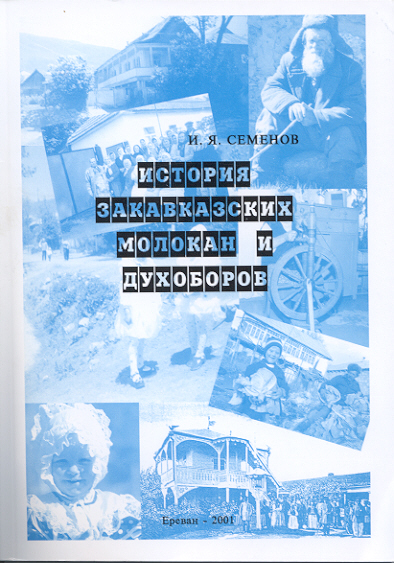 History
of Caucasian Molokans & Doukhobors
Added
Updated Aug 30
History
of Caucasian Molokans & Doukhobors
Added
Updated Aug 30
2001 Aug 10 History of Caucasian Molokans and Dukhobors by
Ivan
Iakov. Sem'onov, President of the Foundation of Help And Assistance to
Russian
Compatriots in the Republic of Armenia, was just published in August 1
in Erevan,
Armenia. Armenian journalist and media analyst Mark Grigorian delivered
7 sample
copies to the L.A. presbyter Ivan Tim. Bagdanov at Big Church on
Sunday, August
12. Grigorian, a proofreader and editor of this new book, happened to
be touring
the U.S. with 6 other Armenian journalists who are doing a
comprehensive report
on America. Luckily, one of the cities he stopped at was L.A. where he
could
visit a few relatives and hand-deliver these books to the Molokans.
Semyononv
provides fresh demographic data on Armenian Molokans, lists their
hardships, and
suggests way to improve their quality of life. If anyone wants to buy a
copy let
me know. Semyonov says postage to the US is $8, but I'm trying to get
some
delivered via the Armenian government.
Doukhobor
and Molokan Street
Names in America
Added Aug 20
2001 Aug 20 Jon Kalmakoff the Doukhobor name/geneology webmaster
(See Doukhobor
Genealogy) is collecting Doukhobor place names. Jon reports
to have
"over 92 in Canada/US already" I added the 4 Molokan streets I know
about: Rudometkin Lane near Woodburn OR, Kanigan Street
in
Sacramento, and Shubin Lane and Bolotin Lane in San
Marcos CA,
then I told him about a Dukhobor Street I found only once near
Portland
OR. Jon responded: "Dukhobor Road in Eugene Oregon! Turns out there was
a
Doukhobor colony the Freedom Colony just north of Eugene in
the
1920's. I've got the City of Eugene officials looking for more
details."
Also: "Veregin Way in Manteca, where the old Russian Colony (Doukhobors and Molokans) was.
If any Molokan NEWS readers can help locate more Molokan or Doukhobor
place
names, and/or add more details, like how the names got placed, please
send them
in.
Molokans
Help Doukhobors in Caucasus
Added Aug 17
1985 Roman Ivanovich Kanigan: The
Shackled
One By Marion Demosky This is one of many Stories
& Articles at Doukhobor
Genealogy "when going through the Caucasus area, they came
upon
some .... Molokans ..[who] begged the captain of the guards to
stop
at their place for a rest. They heated up their steam baths, washed the
clothes worn by the Doukhobors, and steamed out the lice
thus
alleviating their sufferings. ...The chains were so deeply imbedded in
the flesh, to the very bone. ... the Chevildeevs, were of the DonCossacks,
converted into the Molokan faith". Marion often told me she was
related to the Molokans, and at the end of her story she gives
her Kanigan
family tree. Good drawings, too. (Did you know of the Kanigan
Street in Sacramento, California, named by a local Molokan
contractor?
I'm related to him Selimskii.)
Molokans
Affect Baptist History in Russia
Updated Jun 7, 2008
1999 December 8 Molokans, Stundists, and
Pashkovites: A Historical and Sociological Examination of the Baptist
Schism
in the Soviet Union Britt McClung, graduate student, Baylor
University
"This paper will first briefly examine the historical development of
the Baptists as a sect in Russia, focusing on the contribution of
several
Western-oriented sects and the Russian Molokans to that
development.
...In addition, the paper will explore the hypothesis that the
church-state
beliefs of the Molokan sectparticularly the desire to achieve
and
maintain a position of influence via numerical strengthplayed an
overlooked
role in the schism." This paper enhances and updates Russias' Secret,
for
example by providing the date (1867) that Nikita Voronin, was adult
baptized
in the Caucasus. McClung reports this was the first Baptist conversion
in Russia, but Chapter
13 of Russias' Secret reports baptizms as early as 1862 in
Ukraine.
Also we learn about Ivan Zhidkov in Russias' Secret, then about
his son Yakov who becomes the AUC chairman. More analysis later in
updates.....and
send in your insights and research.
Los Angeles
UMCA Picnic
Added Aug 11
2001 Aug 11 Today is the big LA Molokan picnic at sunburn park. Make
sure
you brought hats, umbrella, and sun screen.
Russia
Religions Unite
Added Aug 9
1999 January 8 Jewish News Russia's major faiths link in move
to strengthen ties by Lev Krichevsky MOSCOW
Representatives of Russia's major faiths have created an interfaith
body
aimed at bringing the country's religious groups closer together....the
council's work will be based on the "principle of equality" of all
faiths. [This is an indication that the politics of religion in Russia
is good
for Molokans there.]
New
Book About Doukhobor History
Added Aug 3
2001 Aug 3 Doukhobor Ship Passenger Lists, 1898-1928, 154
pages,
by Steve Lapshinoff and Jonathan Kalmakoff. "5,200 passenger names
taken
from over 30 lists ... name, family group, age, sex, occupation, ship,
dates of
departure and arrival, and ports of departure and arrival and intended
destination of each Doukhobor passenger. ... full bibliographic
references and a
comprehensive index...." Cost: AMERICAN: $16 ($12 + $4 shipping). Send
cheque or International Money Orders. CANADIAN: $18 + postage."
New Book
About Molokans &
Doukhobors in the Caucasus
Added Aug 3
2001 Aug 3 History of Caucasian Molokans and Dukhobors by
Ivan
Semenov, Director of Russian Immigration in Erevan, was just published
in either
Russia or Armenia. Armenian journalist and media analyst mark Grigorian
will be
delivering sample copies to an LA presbyter August 10-12. More info
later.....
Visit
Baja California's Russian Community
Added Aug
3
2001 Oct 13 San Diego Natural History Museum, Adult Educational
Programs,
offers round-trip bus tours from San Diego to the Molokan colony and
museum in
Mexico. "visit two local museums ...(one)... in Guadalupe Valley to
learn
about the Russians' flight from religious persecution and the early
days of
their settlement. ... enjoy a traditional Russian meal in the home of
one of the
founding families. .... Price includes transportation, museum admission
fees,
and lunch. .. $69- $79. ...Sorry, this trip is
filled!" Instructor: Therese Muranaka, Ph.D., an archaeologist, has
researched the history and settlement patterns of the Spirit Jumper
Russian sect
of Baja California's Guadalupe. Hey, someone should arrange a tour for
us
Molokans. Who's going to volunteer?
In
1971 Subbotniki Dissolve, Gift $800 to UMCA Added Aug
2
1971 Summer The Molokan by Alex Tolmas 12 Subboniki
members regrettably dissolved their church in LA in 1971. Here's a
historical
photo of that event as they gift the remainder of their treasury to the
UMCA with appreciation to the entire Molokan community.
Chechen Bomb Near
Russian
Molokans Again Added
Aug
1
2001 August 1 Los Angeles Times Russian Commandos End Bus
Hijacking by Maura Reynolds A bus with upto 40
passengers was
hijacked in the morning in Nevinnomyssk by a Chechen rebel carrying
bombs. The
bus passed through Stavropol' and the rebel with a grenade and gun was
captured
hours later in Mineralniye Vody. Dozens of Molokan communities were
along the
path.
GPR Doesn't
Work
for Arizona Cemetery
Added Aug
1
2001 July 25 Arizona Republic Glendale/Peoria Community Edition
page 1 High-tech search fails to uncover cemetery's secrets
by Connie Cone Sexton Ground penetrating radar failed to
penetrate the
high clay soil in the Arizona Cemetery. Locating graves without markers
will
required digging.
 Allan
Zolnekoff in LA Times
Added July
31
Allan
Zolnekoff in LA Times
Added July
31
2001 July 25 Los Angeles Times In Finding Father, He Solved
a Musical Mystery by John L. Mitchell Allan Zolnekoff, Mayor
of
Whittier, California, is getting some press regarding the interesting
story
about his Russian and musical roots and how he got adopted by a Molokan
family.
Also see Allan's website: www.AllanZ.com
John
Matchniff Helped 3 Famous
Soviet Flyers Added
July
31
2001 July 22 Los Angeles Times page B4 Three Soviet Fliers'
1937 Happy Landing in a Southland Pasture On July 14, 1937, a
single-engine
Soviet plane pioneering a polar route around the world was heading for
San Diego when fog forced it to land in Riverside County. It flew 6300+
miles from Moscow in 62+ hours. San Jacinto farmer John Matchniff
helped
dismantle the plane. For his help he was given 70 gallons of gasoline
from
the plane. He filled 100s of small bottles with the gas and sold them
for
50 cents each. A big profit for that time.
2 Molokan Churchs listed
on Internet Added
July
22
So far I've only found 2 registered Molokan church addresses on the
web:
in Omsk,
Russia, and in South
Australia:
| Translation of Omsk: Shniakin Aleksandr Fedossevich, President of the congregation Spiritual Christian-Molokan, Prayer house: 142 20th Liniia Street |
South Australia A0268: Church Of True Christians Spiritual Inc Molokan Lediaev Bill, Rev Lot 3 Angle Vale Road Evanston Gardens SA 5116 |
2001 July 18 Here is the 3rd chapter of the Marie N. Shubin-Bestwick biography by her grand-daughter Gwyn Jolly. Americanization of names; Life in the Flats; Mom's near death experience; Marry in or out? Chapters 1 & 2 were announced July 3. Here's how you readers can help: "Would someone who knows please fill in the missing spouses names, church membership and send them in?" Spasibo.
- Elsie (Parasha) 1903-1996 married Andrew Shubin 1901-1952.
- John married Hazel ? who was also a Molokan.
- Pete married Faye ? who was also a Molokan.
- Anne did not marry and died young.
GPR to be used
at Molokan Cemetery
Added July
12
2001 July 12 Glendale Star by Glenn Swain "The
Arizona Molokan Cemetery ... Ground penetrating radar, or GPR, will be
used later this month to locate unmarked graves. The University of
Arizona has the only GPR service in Arizona, and can do the work for
less than $1,000. ... It is estimated the process will take a day to
complete. The cemetery will be marked in a grid, with scan lines marked
on the surface every two and one-half to five feet."
Biography
of
Elsie Shubin Added
July
12
Born in 1903 in Selim, Kars, in the Caucasus ... to America at 9 ...
Los Angeles at 15 ... married at 18 ... raised 4 children, 14
grandchildren
and 25 great-grandchildren. "I didn't think to take up creative writing
' till I was eighty years old."
A Molokan's
Search
for Truth Tolstoy/Zheltov
Added July
5
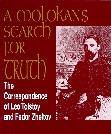 2001
June 1 A Molokan's Search for Truth : The Correspondence of Leo
Tolstoy
and Fedor Zheltov, 155 pages, paperback. The 51 letters between The
Count
and Molokan martyr Zheltov are finally available in English! F.A.
Zheltov and his son were shot to death for being outspoken Molokans.
The letters dating from 1887 to 1909 discuss educational issues
(especially
relating to child-raising), the true meaning of literature, marriage,
prayer
(should it be in a group of in solitude?"only in solitude," replies
Tolstoy), the person of Jesus Christ, famine, drunkenness, and useful
books for
the people to read. In 1887, Zheltov tells Tolstoy: "We are
simple
people, ... peasants literate, but not well-educated; ... we realize
that
these great truths ... love for one's neighbor, love for one's enemy,
love for
God, hence in knowledge of God, in an understanding of good and
truth...The
people of whom I am speaking are the sectarians the "Spiritual
Christians," or simply, Molokans." $20 from The
Station (no charge for shipping), or from Amazon.com.
This is a page-for-page translation of the
Russian version, available for $15. Also see the University
of Ottawa website.
2001
June 1 A Molokan's Search for Truth : The Correspondence of Leo
Tolstoy
and Fedor Zheltov, 155 pages, paperback. The 51 letters between The
Count
and Molokan martyr Zheltov are finally available in English! F.A.
Zheltov and his son were shot to death for being outspoken Molokans.
The letters dating from 1887 to 1909 discuss educational issues
(especially
relating to child-raising), the true meaning of literature, marriage,
prayer
(should it be in a group of in solitude?"only in solitude," replies
Tolstoy), the person of Jesus Christ, famine, drunkenness, and useful
books for
the people to read. In 1887, Zheltov tells Tolstoy: "We are
simple
people, ... peasants literate, but not well-educated; ... we realize
that
these great truths ... love for one's neighbor, love for one's enemy,
love for
God, hence in knowledge of God, in an understanding of good and
truth...The
people of whom I am speaking are the sectarians the "Spiritual
Christians," or simply, Molokans." $20 from The
Station (no charge for shipping), or from Amazon.com.
This is a page-for-page translation of the
Russian version, available for $15. Also see the University
of Ottawa website.
Russians
and East Europeans in America
Added July
10
"Waves of Immigration The First Wave: Freedom from religious
persecution. The first wave of mass immigration from Russia and
Eastern
Europe took place in the second half of the nineteenth century and
early
twentieth century before World War I. The majority of those arriving
were Jews
... Other immigrants included Russian religious pacifist groups that
were in
conflict with the Russian Orthodox church. Among them were Russian Molokans
and the Russian Old Believers (Starovery).
Russian Molokans. The name "Molokan"
originates from the Russian word for milk (moloko) since the
members of
this group do not refrain from milk and other products during Orthodox
fasts. It
refers to those who suffered persecution from both the Russian Orthodox
Church
and the government for their non-traditional beliefs and practices.
Russian Molokans settled primarily in
Los
Angeles area and later in the Willamette Valley in Oregon. Good labor
skills
were valued more than formal education. The Molokan community
is characterized by isolation from the outside world, strong emphasis
on agricultural work, and attendance of frequent religious services
called sobraniye.
Ethiopian
Jewish Family Name "Molokan"
Added July
10
2001 February 1 Global Jewish Agenda "39-year old Gabyenesh Molokan,
a blind olah from Ethiopia, whose sight was restored following surgery
in Israel, will volunteer for the Civil Guard. Gabyenesh is one of 25
Ethiopian
olim living at the Jewish Agencys Sapir absorption center in Kiryat
Yam,
who yesterday completed a special training course in preparation for
serving
in the Civil Guard."
Hiro
Protagonist Added July
10
2001 May 08 In Russian, Molokan means "milk drinker." It also
the name of Christian dissidents who broke away from the Russian
Orthodox Church
in the 17th century. The moniker began after Molokans defied the
prescribed
Orthodox fast days by drinking milk.
They refused to recognize the religious
supremacy of the czar and they follow the Bible literally including
its
dietary laws, although most do not have their meat ritually
slaughtered.
Because of their beliefs, they were
persecuted and forced to resettle in other parts of the Russian Empire
in
southern Ukraine, the Caucasus, Central Asia and eastern Russia, where
many
still reside.
 A
Journey to the Caucasus
Added July
5
A
Journey to the Caucasus
Added July
5
2000 Oct Highlanders : A Journey to the Caucasus in Quest of
Memory, 464 pages, by Yo'av Karny, an Israeli journalist. This new
book explains the turmoil facing Jews and Molokans in Armenia, Georgia,
and Azerbaidjan "a village's worth of inhabitants, are disappearing,
swallowed up by time and the advance of more powerful ethnic and
linguistic
groups .... the long war in Chechnya ... raging for hundreds of years.
Read more at: Amazon.com,
$12.00 "insurrection, civil wars, ethnic conflicts, economic
disintegration,
and up to two million refugees."
 Historical
Survey of Magic and Divination in Russia
Added July
5
Historical
Survey of Magic and Divination in Russia
Added July
5
2000 Sept Book review by Dr. Paert of The Bathhouse at
Midnight: An Historical Survey of Magic and Divination in Russia,
1999, 512
pages in paperback, by W. F. Ryan. A new encyclopedic survey of popular
beliefs
and practices in old Russia. Learn about the precursors to our Molokan
rituals,
like otkrovnie, disclosure "bibliomancy (the
practice of using randomly selected passages in books to predict the
future)". "The line between magical and ... Christian practices was
not a clear one...'dual faith' (dvoeverie) ... semi-pagan
and semi-Christian." Did Molokans have the "enlightenment's
distaste for superstition" against "the 'magical' usage of
icons". Read more at: Amazon.com,
$18.00 "the Number of the Beast, omens, dreams, ..."
 Russian
Skoptsy (the self-castrated)
Added July
5 Updated: Jan 4, 2006
Russian
Skoptsy (the self-castrated)
Added July
5 Updated: Jan 4, 2006
2000 June Book review by Dr. Paert of Castration and the
Heavenly
Kingdom: A Russian Folktale, 296 pages, by Laura Engelstein. A new
book about the Russian sect Skoptsy men and women who
willingly
embraced self-castration believing that it provided the ultimate form
of
salvation for a Christian. The history of the Skoptsy's sect from its
origins
in the 1770s to the 1930s is reviewed by chapter with references other
sectarian scholars. We can debate what effect, if any, the Skoptsy had
on the Jumpers and Maksimisti. Read more at: Amazon.com,
$32.50. "the larger peasant society where marriage was expected
and adulthood began with the wedding night"
 Molokan Garden/Square in Baku,
Azerbaidjan
UPDATED: Mar 23, 2005
Molokan Garden/Square in Baku,
Azerbaidjan
UPDATED: Mar 23, 2005
The "Malakan Garden" or "Malakan
Square" is a park in old downtown Baku where Molokans used to
have a shanty-town and farmers market. When the Molokans were chased
out in the 1940s, they were given a store one block north, which still
operates, and the park was dedicated "Mariinsky Garden", then renamed
to "Khagani Garden". A song refers
to this park by the slang name most Azeris use. Also see post about The Center of the World.
Connections between
Molokans, Jews, and Sabbatarians
Added July 3 Updated: Jan
4, 2006
1997 June Expedition to Azerbaidhan in June 1997 by
V.A.Dymshits,
Research center Petersburg Judaica. A field study of Azerbaidjan Subbotniki and
Tats concludes: "It is obvious that some of the Judaic segregated from
the Molokan sect, one of the Russian Protestant sects." He also
confirms that many Molokans still populate south Azerbaidjan
villages. Also
read
about the "Mountain Jews"..
More
of Dr. Breyfogle's Analysis of Molokan History Added July
3
2001 April 6-9 Work-in-Progress. "Switching Denominations in a
Multi-Confessional Context: The Politics of Religious Affiliation in
Nineteenth-Century Russia" by Nicholas B. Breyfogle, Department of
History,
The Ohio State University. Presented at the Annual BASEES Meeting,
Cambridge,
April 6-9, 2001, on the panel "Mapping Religious Diversity in Imperial
Russia" Breyfogle expands the part of his PhD thesis which examines how
Molokans would join the Subbotniki or Orthodox to get divorced; and
confess to
Orthodox to get travel papers.
Do
As The Doukhobors Do
Added July
3
The famous American folk singer, Pete Seeger, wrote and recorded a
song about the Doukobors. You can't get much better honor than that.
Help
Needed
for Molokan Refugees in Georgia/Russia
Added July
3
2001 July 3 A researcher for the Australian Refugee Review Tribunal
in Sydney, Australia, asks us if we have any information about Molokans
have experienced adverse treatment in Georgia, or Russia. The Refugee
Review
Tribunal is an independent group set up by legislation to review the
merit
of applications for refugee status of persons in Australia.
Biography
of Marie N. Shubin-Bestwick
Added July
3
In 1980 Gwyn Jolly wrote as part of a college assignment a biography
of her grandmother Marie Bestwick (born Akulyna Nikitovna Shubin).
These
first two chapters of that biography may be of interest to those who
would
like to know something of the life of the Molokan people in Russia,
especially
those from Selim, Kars, and also what is was like to enter America
through
Ellis Island.
More press for kosher UCLA football player Efseaff Added July 3
-
 Kosher
Kornerback Jewsweek, 2001 July 10 (with photo)
Kosher
Kornerback Jewsweek, 2001 July 10 (with photo) - Kosher Christian Makes Waves Kosher Today Newletter, 2001 May 7
- Non-Jewish UCLA football player keeps kosher? Jewish World Review, 2001 May 7
- Good-Faith Gesture Los Angeles Times, 2001 April 25
- Efseaff getting noticed at UCLA. Orange County Register, 2001 April 19
- Everything Kosher with Frosh Efseaff Long Beach Press Telegram, 2000 August 16
- UCLA: Religion won't get in the way dailynews.com, September 26, 2001
Molokans accused of worshiping
pagan god: Moloch
1985 May, June In the 1980s, the last Molokan church in the Flats
burned down. Podval Church (from the Russian podval, basement;
also called Shubin's Church) moved to a temporary location in Norwalk,
California, near the 605 freeway, south of the Santa Ana Freeway, and
was nicknamed 605
Church. In 1985, they moved to Clark Ave in La Puente, and got into
an unexpected media blitz accused of being Satanic child molesters
and killers. Police detectives, TV and news reporters were jumping all
over the Jumpers. Read about the "Molestation Case" in the LA Times.
Milikoi Church Moving to
Whittier
2000 June 10 Milikoi Church, now at S.
Eastman & Dennison St in Los Angeles, announced that they will
be moving to the city of Whittier, where they bought an existing church
on the corner of Whittier
Blvd. & Costa Glen Drive (near First Ave). The move may take
place
at the end of this year. See a 1987
picture of their original church building in the village of Milikoi,
near Kars, now in Turkey. This building was used up to 1962 when most
of
the remaining Molokans in Turkey were moved to Stavropol'ksii krai,
Russia.
Also, Whittier Mayor, Allan Zolnekoff reports: "In front of the "New"
Milikoi
church is a fine Kosher Deli run by Yousef (who was born in Israel) but
who goes by the name of Tony, (owner of Tony's New York Deli). Tell him
Allan sent you and try the pastrami. The Russians will end up being his
landlord. Such a Kosher deal!"
 2
New Doukhobor websites Updated July 1,
2006
2
New Doukhobor websites Updated July 1,
2006
2001 May 30 ISKRA is now online in a limited format ISKRAmag.org.
[Now at: ISKRA.ca]
This is a big move for the Doukhobors, with some articles and lots of
pictures,
though only in B&W. Now the UMCA's The Molokan should use the URL
that the
editor uses to bring traffic to his radio business www.TheMolokan.com,
and now is "under construction".
2000 November Kootenay.org, sponsored by the Castlegar Chamber of
Commerce, has donated space for a locally maintained general Doukhobor
website. It has links to the Canadian Doukhobor Society,
Canadian Museum
Of Civilization, Doukhobor Home Page, Doukhobor Village, and much
more
summary information about Canadian Doukhobors with lots of pictures.
50th
Anniversary of Molokan Immigration
from Iran
2001 May/June 50 years ago the first "Persian" Molokans began
to arrive in America. Of the 600 who immigrated, most were
Molokans
(Jumpers, Spiritual, Constants); the others were Baptist, Orthodox, and
Subbotniki/Adventists. To celebrate the event, Bill and Martha Shubin
of Fresno
held a reunion dinner at their house Saturday, June 1. We hope many of
these
families will document their history.
Peter
Gritchen Funeral
v Grand Forksi
2001 May 29 by Koozma J. Tarasoff In commemoration of Peter
M. Gritchen (Aug. 6, 1922-May 27, 2001). Here is a short tribute
that I sent to Peter's sister Lucy Demosky to be read at the Memorial
at
the USCC Centre in Grand Forks, B.C. on Wednesday May 30th. Burial will
be on Thursday May 31.
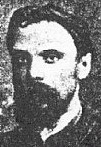 Order
Zheltov/Tolstoy Book for $20
Order
Zheltov/Tolstoy Book for $20
Highgate Road Social Science Research Station is pleased to announce
the
publication in English of A
Molokan's Search for Truth: The Correspondence of Leo Tolstoy and Fedor
Zheltov. The book contains, in addition, introductions by
Andrew Donskov
and Ethel Dunn, placing the Molokans in the social history of the time.
The
price is $20, North American postage included. Mail checks to: The
Station, 2601 Hilltop Drive, Apt. 217, Richmond, CA. 94806.
For further
information please enquire by telephone at: 510-262-9189, or e-mail: etheldunn@sbcglobal.net
Translate
from Russian to English
Tranlsate text, e-mail, and web pages on the Internet. No charge.
BabelFish
links to 4 services: e-lingo, AltaVista, Prompt, and WorldLingo.com.
Bookmark
it. Also see the Russian
Bible (Αθαλθθ).
Russians
and East Europeans in America
From Teaching
Global Studies: A Resource and Curriculum Building Site for Grade
6-12
Teachers, Harvard Faculty of Arts and Sciences, you'd think that
American
Molokans only lived in LA and Oregon: "....Russian Molokans settled
primarily
in Los Angeles area and later in the Willamette Valley in Oregon." Even
Harvard University can't get it right.
Oregon
Church Well Data
How deep is the Gervais church well? 121 feet. When was it drilled?
February 6, 1957. What is its altitude? 181 feet above sea level. What
does it yield? 20 gallons per minute. Look up wells for other Molokan
farmslike
the Konovalovs
Molokan
Elementary School at Risk
1995School
Haze: Air Pollution Near California SchoolsThe Environmental
Working Group reports EPA toxic discharge data for the MES in Hacienda
Heights: 268,400 lbs.of nitrogen/sulfur oxides and particulate matter;
and 3,386 lbs of metal carcinogens and reproductive toxins. "... half
of
the state's schoolchildren ... attended class within a mile of reported
air emissions of chemicals known to cause cancer, reproductive damage,
developmental disabilities or respiratory illness..." [The Promised
Land
is smoggy!]
Molokan
Genealogy at the Polish Project
If you want to click through a labyrinth of Molokan genealogy links
on the WWW, try this site with 6 Molokan links to start.
Donate
to the Kerman UMCA online
Go to U24.Net,
Religious Organizations, California. Click on the Kerman
drop
down list and find Kerman United Molokan Christian Association of
Central
California. Click on Continue. If you buy Internet service from
this site, the UMCA gets a donation.
Little
by Little by Samuel J. Tolmasoff
Cpoyright 1982 Excerpts from "Little by Little"
by Samuel J. Tolmasoff. "The religion that I came from, the Molokan,
began with a semi-literate prophet ... able to sway hundreds of
thousands of
people to his beliefs. .. based on conservative Christianity, more
puritanical
than the American Puritans had dreamed of. ... no icons, no idols or
images; not
even the Cross was allowed to be displayed. ... no ornamentation of any
kind, no
pictures, nothing decorative, no music of any type except acapella
singing
and this was restricted to hymnal and religious songs. The Sabbath was
strictly
observed... I... was born in Mexico, in the Molokan colony near
Ensenada...moved
to ...Glendale, Arizona ... " Also read about his sister in "Religion
and Rebellion"
Molokans
in Mexico (Spanish)
 1905.
A Brief historical Review of Ensenada [Translated from
Spanish]
The first Russian colony of the Malakhanys sect were received by Don
Heraclio
Ochoa. (Molokan) ' molokanes' (milk drinkers) had fled czarist
Russia from
religious persecution are lead by Basilio Pivovaroff, Basilio Tolmasoff
and
Simeon Babichoff, who arranged the colonization of the Valley of
Guadalupe with
the government of Porfirio Diaz through a contract (Daily Official no.
17 of the
20 of March of 1906). 60 families settled down who were mainly
dedicated to
agriculture and raising of the geese and ducks. This group of audacious
young
people left their mother country looking for, in foreign earth,
familiar
well-being and spiritual peace, that after a great passage finally
found it in
Cove [Ensenada]. Photo caption: Russian family of
Molokans
established in the Valley of Guadalupe taking special care of a flock
of geese
from which they obtained meat and feathers that are used in blankets,
pillows,
mattresses and personal clothes. [This is a very large site and may be
slow to
load.]
1905.
A Brief historical Review of Ensenada [Translated from
Spanish]
The first Russian colony of the Malakhanys sect were received by Don
Heraclio
Ochoa. (Molokan) ' molokanes' (milk drinkers) had fled czarist
Russia from
religious persecution are lead by Basilio Pivovaroff, Basilio Tolmasoff
and
Simeon Babichoff, who arranged the colonization of the Valley of
Guadalupe with
the government of Porfirio Diaz through a contract (Daily Official no.
17 of the
20 of March of 1906). 60 families settled down who were mainly
dedicated to
agriculture and raising of the geese and ducks. This group of audacious
young
people left their mother country looking for, in foreign earth,
familiar
well-being and spiritual peace, that after a great passage finally
found it in
Cove [Ensenada]. Photo caption: Russian family of
Molokans
established in the Valley of Guadalupe taking special care of a flock
of geese
from which they obtained meat and feathers that are used in blankets,
pillows,
mattresses and personal clothes. [This is a very large site and may be
slow to
load.]
Molokans
in Gorky's Stories
2001 May Through Russia by Maxim Gorky translated by
C.J. Hogarth in 1921 Gorky, "the
father of Soviet literature", included Molokans in several of his
short
stories. Thanks to this translation posted on JollyRoger.com, we find
Molokans
mentioned in In a Mountain Defile, and The Dead Man.
More
later.
Old
Believer, Molokan, Jumpers & Doukhobors
2001 Religious Costume & Clothing Links at The
Costumer's
Manifesto "...religion is a powerful influence on the history of
dress, so these links are provided for your information. In this list
many
religions are grouped together by clothing style, .. " Be patient, this
site takes a minute to load.
Another
Molokan Website from Russia
2001 May An annonymous Russian Molokan has created a list of links
to Molokan material on the web in Russian and English, with a guest
book
form. Check it out.
Lost
Soldiers of Darkness
2001 May Molokan is now a character in a computer game.
See Character
Profile for Molokan, a Druid. Interesting trivia. I asked the
player
who he was and Kirk Covert
replied: "...it was not inspired by anything, just came up with it. I
heard
there is some play or movie with such a Molokan in it." Now you
have the rest of the story.
Doukhobor
2001 Calendar of Events Updated
July1, 2006
By 2006, the
only online calendar of Doukhobor events is at Spirit-Wrestlers.com, click on "News"
- May 6 USCC Children's Festival, Castlegar
- May 13 Mother's day Peace Walk in Osoyoos
- May 19-20 USCC Union of Youth Festival, Castlegar
- June 25 to Jul 18 Tour Doukhobor Communities in Russia and Georgia
- June 25 Annual Doukhobor Petrov or Peace Day at the Doukhobor Village Museum, Castlegar, B.C. (E-mail: Larry A. Ewashen, curator, or phone: 250-365-5327).
- June 29: Annual Doukhobor Petrov or Peace Day at The National Doukhobor Hetitage Village, Verigin, Saskatchewan. Phone: curator Philip Perepelkin at 306-542-4370.
- July 8 & 9 Whatshan Lake Retreat Family Day
- July 14 & 15 Whatshan Lake Retreat Music Festival
- August 11 Okanagen Family Day, Bertran Park
- August 12 Okanagen Family Day, 9 am Prayer at Mission Creek Park
- August 12 Okanagen Family Day, 10 am Golf at Michael Brook Ranch
- August 18 & 19 Whatshan Lake Retreat Book of Life Seminar
Info@iskra.ca , Phone: 250-442-8252, Fax: 250-442-3433. 17 issues per year. $60/yr Canada, $70/yr US.
 Doukhobors
Topic of TV Documentary
Doukhobors
Topic of TV Documentary
2001 May 10 9 p.m. EST Womens' Television Network (WTN) If
you have cable, be sure to see upcoming episode of the WTN television
documentary
series "Through Her Eyes" entitled
"Daughters of Freedom" premiering
on Thursday,
May 10 at 9 p.m. EST . "In 1956, Helen Chernoff and Kathleen
Shlakoff
(both 8 years of age) were incarcerated in the foreboding New Denver
Dormitory
School after their parents refused to send them to regular school. As
children
of the Doukhobor's radical Sons of Freedom sect, they
were
allowed very little contact with their parents during the 3 years they
were forcibly confined. Daughters of Freedom documents the
unique
friendship that developed between the two girls and their struggle not
only to recover what they lost in New Denver, but to find true freedom
as adults."
Let's Repeal
an Old Anti-Doukhobor Law
2001 May 1 Koozma J. Tarasoff urges
Doukhobors, and
Molokans, to lobby the British Columbia Ministry of Attorney General to
repeal
the Community Regulation Act of March 1914. It's a notorious
anti-Doukhobor Act
in breach of the Canadian Charter of Rights and Freedoms.
Another
Bomb Scares Molokans in Stavropol'
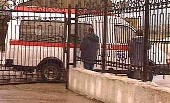 2001 March 23 Essentuki
(between Piatigorsk and Kislevodsk), Mineral Waters Region, Stavropol',
Russian
Federation Two people were killed and 4 were seriously injured as a
bomb
exploded in the Essentuki city cemetery. It was the 4th bombing this
year
in the Northern Caucasus. The recent public bombs have scared away most
of the
clients who seek medical treatment and tourists who vacation in the
Mineral
Waters Region of Stavropol'skii krai. Several thousand-bed medical
clinics
report no patients. These clinics (santori) had waiting
lists
before perestroika, and were 40% full last May due to privatization and
the
Russian economy. Many professionals report that wages are being paid
months
late.
2001 March 23 Essentuki
(between Piatigorsk and Kislevodsk), Mineral Waters Region, Stavropol',
Russian
Federation Two people were killed and 4 were seriously injured as a
bomb
exploded in the Essentuki city cemetery. It was the 4th bombing this
year
in the Northern Caucasus. The recent public bombs have scared away most
of the
clients who seek medical treatment and tourists who vacation in the
Mineral
Waters Region of Stavropol'skii krai. Several thousand-bed medical
clinics
report no patients. These clinics (santori) had waiting
lists
before perestroika, and were 40% full last May due to privatization and
the
Russian economy. Many professionals report that wages are being paid
months
late.
22
million Ellis Island immigrants online
 2001
March American Family Immigration History Center is a database of
the
22 million ship passengers who immigrated to America between 1892 and
1924
through New York. 12 million immigrants passed through Ellis Island,
New
York, between 1892 and 1954. Others passed through the Port of New
York.
It's the most recent large database to be placed on the Internet.
Hundreds
of volunteers typed the ship lists so you don't have to search tons of
micro film looking for your relatives. The site has gotten so much
publicity
that it has been too busy to search for Molokan surnames. Please send
in
what you find and I'll post it.
2001
March American Family Immigration History Center is a database of
the
22 million ship passengers who immigrated to America between 1892 and
1924
through New York. 12 million immigrants passed through Ellis Island,
New
York, between 1892 and 1954. Others passed through the Port of New
York.
It's the most recent large database to be placed on the Internet.
Hundreds
of volunteers typed the ship lists so you don't have to search tons of
micro film looking for your relatives. The site has gotten so much
publicity
that it has been too busy to search for Molokan surnames. Please send
in
what you find and I'll post it.
Northern
Caucasus Molokans NOT to be Liquidated
2001 January 24 Keston News Service Russia: Muslims First
up for mandantory liquidation by Tatyana Titova
Molokans in
Kabardino-Balkar, near Krasnodar, in the Northern Caucasus are spared
prosecution from registration. The first religions to get axed are 37
Muslim and
one Jehovah's Witness. The one Molokan church in Kabardino-Balkar is
spared.
But, this translated news article reports that the Jehovah's Witness
community
in the town of Prokhladny faces court-ordered liquidation. In 1993, I
met
Russian students in Stavropol' who told that most of the Molokans in
Prokhladny
joined the JWs. So these converted Molokans may be losing their church
property
only because they are affiliated with the international JW church.
19
Registered Molokan Churches in Russian Federation
2001 January 1 As of the first of this year, 19 Russian-Molokan
churches have officially registered. Two are listed as Central
churches,
but no Molokan schools.. Molokans are #35 on the list. So who's really
the "Center" and in charge over there? [Use
Russian
Cyrillic font for Windows to view this site.]
New
Molokan website from Russia
2001 April 17 Slavik Ivanov
from Valdikavkaz (formerly Oridzhokitsina, next to Chechnia) assembled
an informative website about Kars MolokansMoi irosticheskii rodina
(My historical ancestors). He's now studying in St. Petersburg. He
wants
to learn more about his family. His grandfather Ivan Petrovich Ivanov
had
a brother who was a master wheel-maker. He reports that in Valdikavkaz
there is a section of town called "Molokanka" (Molokanskaja sloboda).
Slavik
wrote the web site in Esperanto (international English) and Russian, so
that more people will learn about Molokans. The main page includes 2
maps
showing Kars and 6 pictures. The Russian version includes links to 2
excellent
articles on the web about Molokans, one by Svetlana Inikova, of the
Russian
Academy of Sciences in Historical News 1999, and the other
just
published in Itogi 24 April 2001 about Molokans in Armenia with
16 pictures. Thank you Slavik!
Uklein/Dolmatov
Compromise Still Incomplete
Miliukov reports that the sect of Uklein received the name Molokans
from the Orthodox: "those who drink milk during fasts". But when
the evangelic Molokans led by Uklein traveled down the Volga 200+ years
ago, he met ritualistic judiazers led by Dalmatov. To convert
Dalmatov's
followers, Uklein compromisedno pork or scale-less fish, circumcision
optional. To this day, the Uklein/Dalmatov compromise is incomplete and
causes friction among the various factions of Molokans.
Russian JWs
Win in Court but Lose in Public
2001 February/April The Jehovah's Witnesses in Russia won a
difficult
court case in Moscow after years of legal persecution, but lose to
local
control this month in Georgia as the Christian Society, an Orthodox
group,
burns JW and Baptist books. The Molokans and Doukhobors are spared
assaults,
because they are a historic Russian religion. Also see 2001
March 28 Tbillisi, Georgia: Jehovah's Witnesses Books Burned.
Heritage
Village Acquires Doukhobor Elevator
2001 March 29 Kamsack Times page 1 After years of patience
and quiet negotiation it seems certain that a major Doukhobor
agricultural
relic at Veregin will be preserved. ...Veregin's last remaining
elevator,
.. built by Doukhobor pioneers using their own design and methods in
1908...the
National Doukhobor Heritage Village at Veregin will assume ownership of
the elevator, and restore it.
Russian
Molokan-Mormons
2001 March 30 In 1998, an American LDS (Mormon) and BYU
student, James Scott was living in the city of Samara, Russia. He
discovered a group of religionists calling themselves Molokan-Mormony,
but not belonging to the Mormon (LDS) Church based in Utah. He has
conducted
both field and academic research on this obscure group, and is
returning to
Samara in May on a research grant from BYU this time as an ethnographer
to conduct field studies in local villages to uncover, if possible, any
connection between the Samara Molokan- Mormons and the history
of the American Mormon movement.
Nail in the
Fence
2000 April This was forwarded to us all by the longest serving
Molokan Sunday School teacher in San Francisco. Today's lesson from
Tiotia Antonina is
that
Molokans (and everyone) must try to make peace before holidays (and
everyday). This story is a way to explain that lesson that touched
Tonia enough
to pass it along.
 Research
About Molokans in Park Valley, Utah
Research
About Molokans in Park Valley, Utah
2001 March 28 Mary Washington College,
Fredericksburg,
Virginia Dr. Marshal Bowen is in the early stages of researching the
Utah Molokan colony. His primary goal is "...to understand the
Molokans'
move to Park Valley in the context of city people moving to desert aned
semi-desert localities in the Great Basin..." He is looking for any
descendants
of the Utah colonyChernabaeffs, Kalpakoffs, Kunakoffs,
Rudometkins,
and Volkoffs.
3
Terrorist Bombs Explode Near Russian Molokans
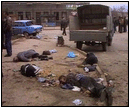 2001
March 24 Stavropol'skii krai, Russia Three bomb-stuffed cars
exploded
almost simultaneously Saturday, killing at least 21 people and injuring
more than 150 in the worst act of terror to hit Russia outside warring
Chechnya in months. The affected towns of Mineral Waters and Essentuki
have no Molokan churches, but many Molokans live and work there, and
1000s
live in adjacent towns with Molokan churches. A Molokan in Yessentuki
who
lives 3 blocks from that blast reports by phone that her house shook so
hard that their pots and pans fell off the wall hooks. Previous
bombings
were in nearby Piatigorsk last December.
2001
March 24 Stavropol'skii krai, Russia Three bomb-stuffed cars
exploded
almost simultaneously Saturday, killing at least 21 people and injuring
more than 150 in the worst act of terror to hit Russia outside warring
Chechnya in months. The affected towns of Mineral Waters and Essentuki
have no Molokan churches, but many Molokans live and work there, and
1000s
live in adjacent towns with Molokan churches. A Molokan in Yessentuki
who
lives 3 blocks from that blast reports by phone that her house shook so
hard that their pots and pans fell off the wall hooks. Previous
bombings
were in nearby Piatigorsk last December.
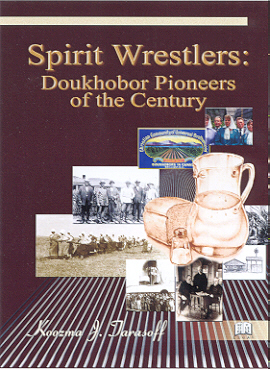 Special
Discount for Spirit Wrestlers book and CD-ROM
Special
Discount for Spirit Wrestlers book and CD-ROM
2001 March 15 Spirit Wrestlers: Doukhobor Pioneers of the Century
by Koozma Tarasoff. Doukhobor historian and author Tarasoff needs help
financing his most extensive documentation of Doukhobors ever, soon to
be published in the most advanced print and digital forms700
graphics,
video, and audio. He needs $100,000. Help support this project.
Tolstoy
Series: Letters with Molokan Martyr F.A. Zheltov
Canada, University
of Ottawa, Slavic Research Group Volume
2 in this series is Tolstoy's correspondence with a Molokan peasant
writer
and philosopher, Fedor Alekseevich Zheltov L.N. Tolstoy i
F.A.
Zheltov: Perepiska, compiled by Ljudmila Gladkova of the Moscow
L.N. Tolstoy Museum. Price: C$20.- (outside Canada: US$16, C$24).
Edited
and with an introduction by Andrew Donskov, the correspondence
comprises
fifty-one letters 37 from Zheltov to Tolstoy (in print here fo the
first
time) and 14 from Tolstoy to Zheltov (corrected according to original
manuscripts).
While this publication is in Russian only, an English translation, by
John
Woodsworth of the SRG, is soon to be published under the editorship of
Ethel Dunn of the Highgate Road Social Science Research Station in
Berkeley
(California), USA. Order for $20 from The
Station.
Searching
4 Ancestors!
by Manya Kobzoff-Woods Looking for
Ancestors
from Russia/Mexico with Molokan background. Father born in Ensenada,
Mexico: Kobzeff. His mother's maiden name: Samarin,
Pearl; My
mothers
maiden name: Belousov. Added to Molokan
Genealogy.
Big
Panda Comics with Dark Lord Molokan
![]() 2001
January 23 Man and Balloon by Glen Dudley
"Once
upon a time, in the far off land of Faerie, two children were born.
Through some
random chance of fate, they were both transported to Earth, though
neither was
aware of their off-planet ancestry. After having a few zany escapades
on their
new homeworld, they were brought to Faerie in order to save the land
from the
evil Dark Lord Molokan. It's hard work, but they seem to be
getting the job
done."
Author Glen Dudley e-mails that he didn't know there were real
Molokans, and
that he can't remember how he came up with the word. Read his e-mail. Also see Molokan, a powerful
magician.
2001
January 23 Man and Balloon by Glen Dudley
"Once
upon a time, in the far off land of Faerie, two children were born.
Through some
random chance of fate, they were both transported to Earth, though
neither was
aware of their off-planet ancestry. After having a few zany escapades
on their
new homeworld, they were brought to Faerie in order to save the land
from the
evil Dark Lord Molokan. It's hard work, but they seem to be
getting the job
done."
Author Glen Dudley e-mails that he didn't know there were real
Molokans, and
that he can't remember how he came up with the word. Read his e-mail. Also see Molokan, a powerful
magician.
Little
Tokyo's Roots Firm After
Trials
2001 January 21 Los Angeles Times by Cecilia Rasmussen "...
in the nearby Los Angeles River, while Russian children, the offspring
of Molokan Russians, scared off the Japanese kids with
slingshots." Will
someone scan and send in this 973 word article?
The
Maritime Heritage Project ERRORS!
"The first Russian settlers in America were fur traders who crossed the
Bering Strait into Alaska in the mid eighteenth century. ...
Also, members
of persecuted religions such as the Molokan and Orthodox crossed
the strait to escape government oppression in Russia. These people
converted many Eskimos to their religions, and started small
communities in
Alaska. ...." [Molokans did not cross the Bering
Strait to come to America! Molokans did not convert Eskimos! Molokans
did
not start villages in Alaska!]
200th
Molokan Anniversary Announced
2001 January 13 Fast with prayers on
15-16-17
March, year 2001. On 13 July, 2001, the Spiritual Committee of
the
Center decided to conduct a three-day celebration with a prayer at the
Center of SCM of Russia at Kochubeevskoe, to commemorate the 200th
anniversary
of the Royal edict of freedom for our ancestors. In 1805, Tsar
Aleksandr
Pavlovich decreed freedom of religion to all Molokans. [Don't ask why
they
are doing it 4 years early.]
Photos from
Blagoveshchensk
2001 March 20 Jenny
Kondrashov-Clark sends in old family photos from Blagoveshensk (Far
East) her grandfather,
grandfather's sister and fiancee in exile in Japan, and two
unidentified girls.
No dates are given."My family were Molokans from Blagoveshchensk. I am
gathering photographs, stories and history from my father and Uncles to
write a
novel based on their very interesting history. I have photographs of
the
Molokans in Blagoveshchensk, and the Hotel which they built in 1914. I
also have
a photo taken in early 1900's of the waterfront of Blagoveshchensk. A
town that
was mostly built by industrious Molokans. I would love to be able to
share and
trade information."
America,
Russia, and the Meeting of Frontiers
Colonization, Religious Flight and Migration Here's a
Library
of Congress site in Russian and English which compares the American
treatment
of Mormons to the Russian treatment of sectarians. "In the late
nineteenth
and early twentieth centuries, the Russian Far East became the locus of
sectarian settlement. Old Believers, along with Dukhobors, Molokans,
German Mennonites and Baptists streamed to the newly acquired lands.
During
this period the Amur district had more religious sectarians than any
other
province in Russia. Sectarians rejected alcohol and emphasized
self-reliance
and hard work; these traits made them very successful as colonists,
helping
them to build productive farms and vibrant communities."
24-hour
Molokan Funeral Announcements
at 323-724-3984
A little known free service to all Molokans is the
funeral
message service. 15 years ago, long after telephone answering machines
were available, the new directors of the Russian Molokan Christian
Spiritual
Cemetery, near Los Angeles, decided to get one to help us all
communicate.
For years Klubnikin's Store, on Whittier Blvd., hosted the announcemnt
bulletin board. When Klubnikin's closed we had no central communication
port. Messages can be left or heard at any time by telephoning
323-724-3984.
Perhaps some of you who are less shy of exposing Molokans in cyberspace
may start using the Molokan
Forum for announcemnts.
"Church
Asked to Forgive Tolstoy's Sins"
2001 February 27 The Moscow Times By Sarah Karush "His
philosophy
contradicted official church doctrine and was deemed heretical." But
his
great-great-grandson asked the church to forgive him "...horrifying
some
scholars, who say Tolstoy would never have asked for forgiveness from
the
church he scorned."
Ohio State
University Recognitions
I'm hoping to get copies of these presentations by Dr.
Breyfogle to post.
- 2000 December 21 Nicholas Breyfogle, History, presented "Empire and Ecology: Russian Colonists and the South Caucasian Environment in the 19th Century" at the Midwest Russian History Workshop, University of Chicago, Oct. 20; "Swords into Plowshares: Opposition to Military Service among Religious Sectarians, 1770s to 1874" at the Davis Center of Russian Studies, Harvard University, Cambridge, Mass., Sept. 10; and "Molokan History in Russia" at the Molokan Heritage Center [Molokan Cemetery Chapel], Los Angeles, Aug. 12. [This last is on tape. I have 15 copies.]
- 2000 June 8 Nicholas Breyfogle, History, presented "Caught in the Crossfire: Russian Civilians in the Russo-Turkish Theater of War, 1853-56 and 1877-78" at the Maryland Workshop in Russian Studies, March 25.
- 2000 May 11 Nicholas Breyfogle, History, presented "Colonial Contact as Creation: Relations Between Russian Settlers and the Peoples of Transcaucasia, 1830-1900" at the Centre for Russian and East European Studies, University of Toronto, March 16.
- 2000 April 6 Nicholas Breyfogle, History, presented "Empire and Identity: Ethnicity, Religious Affiliation and State Service Among Russian Settlers in Transcaucasia, 1830-1900" at the Advanced Study Center of the International Institute, University of Michigan, Ann Arbor, Mich., Feb. 9; "Rethinking the Origins of the Doukhobor Arms Burning, 1887-1893" and "Exploring the Doukhobor Past in the New Millennium" at the Doukhobor Centenary: A Multi-Disciplinary Perspective on their Unity and Diversity conference, University of Ottawa, Oct. 23.
- 2000 April 20 Nick Breyfogle, History, presented "Sword into Plowshares: Religious Opposition to Military Service in 19th Century Russia" at the AAASS Conference, St. Louis, Nov. 19-21.
- 1999 November 10 Nicholas Breyfogle, History, $3,075 IREX Travel Grant for research in Georgia and Azerbaijan. [This is how he go to the archives.]
2001 February 4 This article reports some of the problems facing the large (population 50,000+) Mennonite colony in Mexico just below the state of New Mexico. In 1929, Canadian Doukhobor Sons of Freedom and Arizona Maksimisti explored the possibility of moving their colonies to Mexico, near these Mennonites. In general the Mennonite pakhod faces the same problems with teenagers, marrying out, drugs and infidelity that we do in America and Canada.
Ukranian
Christian Center Sells First Russian Molokan Song Tape
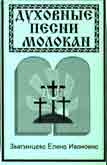 On-Line
Magazin [store] lists item #5: "Spiritual Songs of Molokans"
(60 min. tape) Translation: "This material doesn't have anything to do
with
apolegetics, but we decided to be responsible for distribution of this
tape due
to its uniqueness. It's not a secret that today's popular spiritual
music has
Greek-Byzantine, German or American sources (it depends on the time of
formation
of the confessions on the East-Salvic culture plain). For us it was a
joy to
discover traditional Russian folksongs with evangelic contents. We were
able to
organize the recording of these songs performed by Elena Ivanovna
Zviaginsteva,
who remembered them since she was a kid. This tape will get get the
attention of
lovers and researchers of Eastern Slavic folk creativity." Listen
to a sample in MP3. 60 minute cassette, Cost 4 griven CD cost 10
griven
[Griven is Ukranian money. 1 griven = $0.20]. Thanks to the Christian
Center for Science and Apologetics for documenting our Molokan
culture in
the Ukraine, but they goofed by putting crosses on the cover. The
singer died
last year. She was from Cherkassy (Central Ukraine). Read Cherkassy
history. Map showing Cherkassy
south-east of Kiev. Thousands of Molokans still live in the Milky
Waters
region east of Melitopol near the Sea of Azov. I have a master CD and
will make
copies for sale. 20% will go to the organization that recorded this.
Stay tuned/bookmarked
for prices and contents. There's a lot of transcribing and translation
to do.
On-Line
Magazin [store] lists item #5: "Spiritual Songs of Molokans"
(60 min. tape) Translation: "This material doesn't have anything to do
with
apolegetics, but we decided to be responsible for distribution of this
tape due
to its uniqueness. It's not a secret that today's popular spiritual
music has
Greek-Byzantine, German or American sources (it depends on the time of
formation
of the confessions on the East-Salvic culture plain). For us it was a
joy to
discover traditional Russian folksongs with evangelic contents. We were
able to
organize the recording of these songs performed by Elena Ivanovna
Zviaginsteva,
who remembered them since she was a kid. This tape will get get the
attention of
lovers and researchers of Eastern Slavic folk creativity." Listen
to a sample in MP3. 60 minute cassette, Cost 4 griven CD cost 10
griven
[Griven is Ukranian money. 1 griven = $0.20]. Thanks to the Christian
Center for Science and Apologetics for documenting our Molokan
culture in
the Ukraine, but they goofed by putting crosses on the cover. The
singer died
last year. She was from Cherkassy (Central Ukraine). Read Cherkassy
history. Map showing Cherkassy
south-east of Kiev. Thousands of Molokans still live in the Milky
Waters
region east of Melitopol near the Sea of Azov. I have a master CD and
will make
copies for sale. 20% will go to the organization that recorded this.
Stay tuned/bookmarked
for prices and contents. There's a lot of transcribing and translation
to do.
Land
Purchased for Moscow
Molokan Church
2000 The Molokans in Moscow have been meeting in homes since
Alexandrov
first organized the Russian Molokans in 1992. The Moscow Molokan church
members
are primarily from Tambov, Azerbaidjan, and Armenia. With help from a
local
Doukhobor contractor they almost bought a building few years ago but
could not
raise the $250,000 needed. Now it seems they secured a piece of bare
land.
More about this later as news comes in. I'm sure they'll appreciate any
donations you can send.
Dr. Waters'
Lecture was Banned by UMCA Board
Sorry to report that the UMCA was asked to host this lecture, and the
Board of Directors flatly refused because they didn't want "any more
dissertations".
Some board members attended Dr.
Breyfogle's lecture in LA, and apparently didn't like to hear so
much
information about Molokans. It seems that fear of knowledge is very
active
politically among many American Molokans. I hope they don't attack
those
trying to help the Russian archive research project. You may yet get to
meet and hear Dr.Waters if he participates in the "Your
Boyle Heights" project this year. Stay tuned.
American
Jumper-Molokan Holidays for 2001
2001Paskha Apr 7-14, Pentikost
May 27, Pamiat Trub Sep 17, Sudnie Den' Sep
26, Kuscha Oct 1-8.
American Jumper/Maksimist
Dogma Amended and Edited
2000 Tenets and Principles of the True Spiritual Christian
Russian Molokans, Since 1803. 29 articles of dogma of the American
Jumper/Maksimisti-Molokans.
Articles 26 and 27 were amended and edited in 2000 in Los Angeles to
include
jury duty and taking oaths. Download
an 8-page booklet version in MS-Word.
3 Molokan Websites
Registered
2000 December 23Molokan.net
(now off-line) was recently
registered to Jeremiah
Lediaev, Fresno CA under his business, ComPort Systems. His page
lists many
plans (calendar, chat, BB, store, dictionary, songs, ....) and
frustrations.
(Help: 32
online Russian dictionaries/references and more.) TheMolokan.com takes you to Nick
Federoff's business website, Whittier CA, not anything Molokan.
Strange that
as editor he also uses The Molokan to promote his business! And
Molokan.com
is inactive but apparently registered to the LA-UMCA
in Montebello.
Russian
Molokan Website Moved to CyberCities
2000 December 19 Tambov, Russian Federation "I had some problems
with using Cybercities. After several attempts to fix it, I had to
register the
home page on another server. Now you may read, download, print and give
to your
friends the Russian Molokan journals by clicking the following
URL: http://www.geocities.com/spchmol/
Most links are reserved for the future. Today links work to journals
"Mlechny
put" and "Dobry domostroitel". I have a little, very little time
to construct this Home Page, but I will try to improve some mistakes.
http://www3.cybercities.com/s/spiritual does not work. Best regards,
Sergey
Petrov < psp@tamben.elektra.ru
>. [See story below from September 2000.]
Back to Molokans and Jumpers Around the World